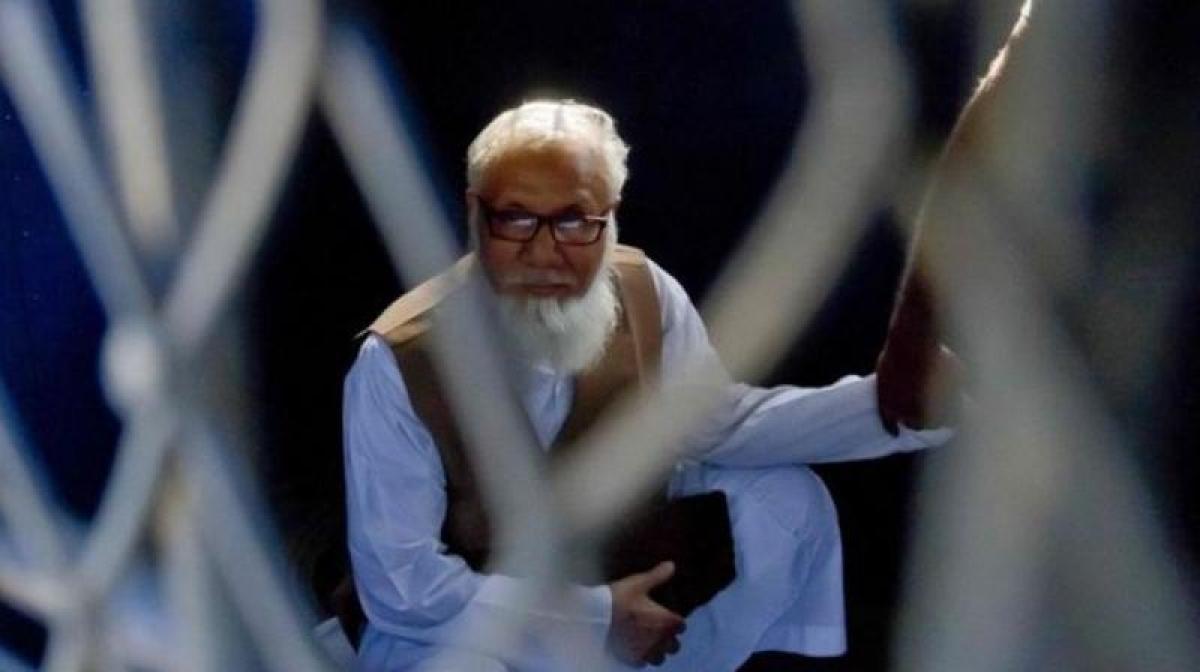Live
- Punjab DGP, MHA official request farmer leader Dallewal to end 20-day fast
- Govt unveils ‘Jalvahak’ to boost inland waterways
- List of criminals: Delhi BJP chief on AAP panel of 38 candidates
- PSBs in India clock record Rs 1.41 lakh crore in net profit in FY24
- Telangana Government Announces Key Development Plans: Bhatti Vikramarka
- Crackdown on illegal poppy farming in Manipur: Assam Rifles destroyed 6,228 acres in 5 years
- South Korea's ruling party leader cancels press conference amid calls for resignation
- AIADMK's big meet discusses 2026 polls, prospective alliances
- BJP questions Congress-Shiv Sena (UBT) alliance over Aaditya Thackeray's Savarkar-Nehru remark
- Maha Oppn to boycott customary CM tea meet, cites rising farmers' distress, atrocities against Dalits
Just In

Bangladesh hanged Islamist party leader Motiur Rahman Nizami on Wednesday for genocide and other crimes committed during the 1971 war of independence from Pakistan, the law minister said, risking an angry reaction from his supporters.
Bangladesh hanged Islamist party leader Motiur Rahman Nizami on Wednesday for genocide and other crimes committed during the 1971 war of independence from Pakistan, the law minister said, risking an angry reaction from his supporters.
Nizami, head of the Jamaat-e-Islami party, was hanged at Dhaka Central jail just after midnight, Law Minister Anisul Haq told Reuters, after the Supreme Court rejected his final plea against a death sentence imposed by a special tribunal for genocide, rape and orchestrating the massacre of top intellectuals during the war.
Nizami, 73, a former legislator and minister during opposition leader Khaleda Zia's last term as prime minister, was sentenced to death in 2014.
Hundreds of people flooded the streets of the capital, Dhaka, to cheer the execution. "We have waited for this day for a long 45 years," said war veteran Akram Hossain. "Justice has finally been served."
But the war crimes tribunal set up by Prime Minister Sheikh Hasina in 2010 has sparked violence and drawn criticism from opposition politicians, including leaders of Jamaat-e-Islami, that it is victimizing Hasina's political opponents.
Thousands of extra police and border guards were deployed in Dhaka and other major cities. Previous similar judgments and executions have triggered violence that killed around 200 people, mainly Jamaat activists and police.
Five opposition politicians, including four Jamaat-e-Islami leaders, have been executed since late 2013 after being convicted by the tribunal.
STRIKE CALL
Jamaat-e-Islami, which has said the charges against Nizami were baseless, called for a nationwide strike on Wednesday in protest. Calling Nizami a 'martyr', it said he was deprived of justice and made a victim of a political vendetta.
The U.S. State Department said that while it supported justice being carried out for the 1971 atrocities, it was vital that the trials of those accused are free, fair and transparent and conducted in accordance with international agreements.
"While we have seen limited progress in some cases, we still believe that further improvements to the ... process could ensure these proceedings meet domestic and international obligations," State Department spokeswoman Elizabeth Trudeau said in a statement. "Until these obligations can be consistently met, we have concerns about proceeding with executions."
About three million people were killed, the government says, and thousands of women were raped during the 1971 war in which some factions, including the Jamaat-e-Islami, opposed the break from what was then called West Pakistan.
The party denies that its leaders committed any atrocities.
International human rights groups say the tribunal's procedures fall short of international standards. The government denies the accusations.
The execution comes as the Muslim-majority nation suffers a surge in militant violence in which atheist bloggers, academics, religious minorities and foreign aid workers have been killed.
In April alone, five people, including a university teacher, two gay activists and a Hindu, were hacked to death by suspected Islamist militants.
International human rights groups say a climate of intolerance in Bangladeshi politics has both motivated and provided cover for perpetrators of crimes of religious hatred.

© 2024 Hyderabad Media House Limited/The Hans India. All rights reserved. Powered by hocalwire.com







